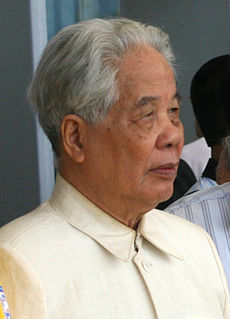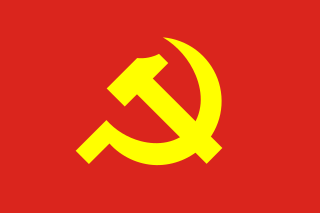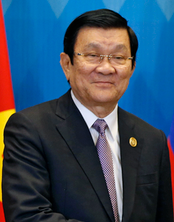Related Research Articles

The politics of Vietnam are defined by a single-party socialist republic framework, where the General Secretary of the Communist Party of Vietnam is the Party leader and head of the Politburo, holding the highest position in the one-party system. The President of Vietnam is the head of state, and the Prime Minister of Vietnam is the head of government in a one-party system led by the Communist Party of Vietnam. Executive power is exercised by the government and the President of Vietnam. Legislative power is vested in the National Assembly of Vietnam. The Judiciary is independent of the executive. The parliament adopted the current Constitution of Vietnam; its fifth, on 28 November 2013.

The Communist Party of Vietnam (CPV) is the founding and ruling communist party of the Socialist Republic of Vietnam. Since 1988, it has been the only legal party in the country. Although it nominally exists alongside the Vietnamese Fatherland Front, it maintains a unitary government and has centralised control over the state, military and media. The supremacy of the Communist Party is guaranteed by Article 4 of the national constitution. The current party's leader is Nguyễn Phú Trọng, who holds the titles of General Secretary of the Central Committee and Secretary of the Central Military Commission.

The President of the Socialist Republic of Vietnam is the head of state of Vietnam, elected from members of Vietnam National Assembly. Since Vietnam is a single-party state, the President is generally considered to hold the second highest position in the political system, after the General Secretary of the Communist Party of Vietnam. In addition, the president appoints the head of government, the Prime Minister. As head of state, the President represents Vietnam both domestically and internationally, and maintains the regular and coordinated operation and stability of the national government and safeguards the independence and territorial integrity of the country.

The 1970 United States House of Representatives elections was an election for the United States House of Representatives held on November 3, 1970, in the middle of President Richard M. Nixon's first term. The President's Republican Party lost seats, in this case a net of 12, to the Democratic Party, which thus increased modestly its majority in the House. Many viewed the results as the American public showing fatigue over the ongoing Vietnam War as well as the fallout over the Kent State Massacre. This was also the first House election when all 50 states were using the same regional single-member district system to elect Representatives instead of using at-large congressional districts.

Đỗ Mười was a Vietnamese communist politician. He rose in the party hierarchy in the late 1940s, became Chairman of the Council of Ministers in 1988 and was elected General Secretary of the Central Committee of the Communist Party of Vietnam (CPV) at the 7th Congress in 1991. He continued his predecessor's policy of ruling through a collective leadership and Nguyễn Văn Linh's policy of economic reform. He was elected for two terms as General Secretary, but left office in 1997 at the 3rd plenum of the 8th Central Committee during his second term.

The National Assembly of the Socialist Republic of Vietnam is Vietnam's legislative body.

The 10th National Congress of the Communist Party of Vietnam was held in Ba Đình Hall, Hanoi from 18 to 25 April 2006. The congress occurs every five years. 1,176 delegates represented the party's 3 million members. At the 13th plenum of the Central Committee, held before the congress, it was decided that eight members of the Communist Party's 9th Politburo had to retire. While certain segments within and outside the Politburo were skeptical, the decision was implemented. Because of party rules, the congress was not empowered to elect the general secretary, and it held a survey on whom the delegates wanted to be appointed General Secretary. The first plenum of the Central Committee, held in the immediate aftermath of the congress, re-elected Nông Đức Mạnh as general secretary.

Nguyễn Phú Trọng is a Vietnamese politician who is the current General Secretary of the Communist Party of Vietnam, in office since 19 January 2011, and President of Vietnam, de jure head of state of Vietnam, in office since 23 October 2018.

The General Secretary of the Central Committee of the Communist Party of Vietnam, known as First Secretary from 1951 to 1976, is the highest office within the Communist Party of Vietnam. The General Secretaryship was the second-highest office within the party when Hồ Chí Minh was Chairman, a post which existed from 1951 to 1969. The general secretary is also the Secretary of the Central Military Commission, the leading Party organ on military affairs. For a period in its history, the position of general secretary has been synonymous with leader of Vietnam. The current general secretary is Nguyễn Phú Trọng, and he is ranked first in the Political Bureau.

The National League of Families POW/MIA flag, also known as the POW/MIA flag or simply the POW flag, consists of a silhouette of a prisoner of war (POW) before a guard tower and barbed wire in white on a black field. "POW/MIA" appears above the silhouette and the words "You Are Not Forgotten" appear below in white on the black field.

The Chairperson of the National Assembly of Vietnam, formerly the Chairperson of the Standing Committee of the National Assembly of Vietnam from 1946 to 1981, is the legislative speaker of the Vietnamese parliament, the National Assembly. The parliament is, in the words of the constitution, "the highest representative organ of the people; the highest organ of state power ..., the sole organ that has constitutional and legislative rights".

The Political Bureau (Politburo) of the Central Committee Communist Party of Vietnam, formerly the Standing Committee of the Central Committee from 1930 to 1951, is the highest body of the Communist Party of Vietnam (CPV) between Central Committee meetings, which are held at least twice a year. According to Party rules, the Politburo directs the general orientation of the government and enacts policies which have been approved by either the National Party Congress or the Central Committee.

Trương Tấn Sang is a Vietnamese politician, who served as the seventh President of Vietnam from 2011 to 2016. He was one of Vietnam's top leaders, alongside prime minister Nguyễn Tấn Dũng and Party general secretary Nguyễn Phú Trọng. In July 2011, Trương Tấn Sang was elected state president of the Socialist Republic of Vietnam by the National Assembly of Vietnam and nominated by his predecessor Nguyễn Minh Triết who retired from office.

The 1968 United States elections was held on November 5, and elected members of the 91st United States Congress. The election took place during the Vietnam War, in the same year as the Tet Offensive, the assassination of Martin Luther King, Jr., and the protests of 1968. The Republican Party won control of the presidency and picked up seats in the House and Senate, although the Democratic Party retained control of Congress.

The Deputy Prime Minister of the Socialist Republic of Vietnam, known as Deputy Chairman of the Council of Ministers from 1981 to 1992, is one of the highest offices within the Central Government. The deputy prime minister has throughout its history been responsible for helping the prime minister to handle Vietnam's internal policies. Since Vietnam is a one-party state, with the Communist Party of Vietnam being the sole party allowed by the constitution, all the deputy prime ministers of the Democratic Republic and the Socialist Republic have been members of the party while holding office. There are currently five deputy prime ministers; Trương Hòa Bình, Phạm Bình Minh, Vũ Đức Đam, Vương Đình Huệ, and Trịnh Đình Dũng.

Trần Đại Quang was a Vietnamese politician who was the eighth President of Vietnam, in office from 2 April 2016 until his death in 2018. Trần Đại Quang was elected to the post by the National Assembly of Vietnam, and nominated by his predecessor Trương Tấn Sang who retired from office. Trần Đại Quang was one of the country's top leaders, along with the Communist Party General Secretary Nguyễn Phú Trọng.

The 6th National Congress of the Communist Party of Vietnam (CPV) was held in Ba Đình Hall, Hanoi, between 15 and 18 December 1986. 1,129 delegates represented the party's estimated 1,900,000 members. The congress occurs once every five years. Preparations for the 6th National Congress began with 8th plenum of the 5th Central Committee and ended with the 10th plenum, which lasted 19 days. After the 10th plenum, local and provincial party organizations began electing delegates to the congress as well as updating party documents.
The Lao Veterans of America, Inc., describes itself as a non-profit, non-partisan, non-governmental, veterans organization that represents Lao- and Hmong-American veterans who served in the U.S. clandestine war in the Kingdom of Laos during the Vietnam War as well as their refugee families in the United States.
Socialism in Vietnam, in particular Marxism–Leninism, is the ideological foundation of the Communist Party of Vietnam (CPV) for the development of the country ever since its establishment.
